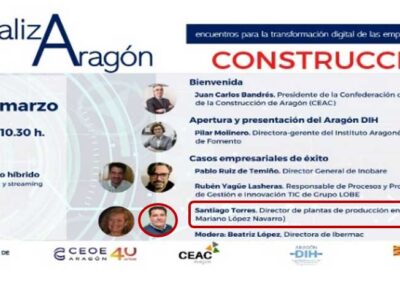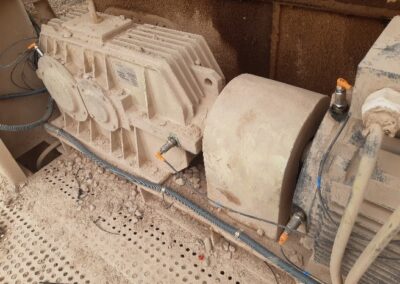Pilot Experiments
DASHEP: Data Analysis and Sensorization in Hostile Environment for Predictive maintenance.
Spain
![]() Aragón DIH
Aragón DIH
Experiment objective
The experiment is aimed at improving the SME’s production process with the uptake of two key technologies in the digitalization process: sensors and data analytics. This innovation will have an important impact in the competitiveness of the Company thanks to an improvement of the quality of service (e.g. decreasing downtimes) and the reduction of costs due to potential failures of the equipment (e.g. fewer parts replacements).
The main objectives of the experiment are:
- Reduce the number of asphalt and concrete plant production shutdowns by implementing a preventive maintenance system based on early detection of abnormal vibrations.
- Reduce repair time and maintenance costs through better intervention planning.
- Increase concrete and asphalt production by optimizing the use of critical production equipment.
- Decreasing non-qualities during manufacturing, being able to replace defective equipment before it affects the quality of the final product.
- Reduce construction costs by minimizing downtime during concrete installation and asphalt paving.
Challenges
A production plant suspension is a negative circumstance because at the construction job the concrete and asphalt machines are expensive to book up and move. That increases the costs significantly. Aside from delaying the construction works.
An anomalous functioning of machines at the critical points is not a guaranteed stop but can affect adversely to the final product quality. Therefore, a customer claim could be a high amount of money. And in addition, it could be necessary to replace the material generating more costs.
Implementation Solution
The concept of the experiment consists of the implementation of a sensorization system, which provides data that, after a machine learning process, allows the maintenance tasks to be predicted well in advance.
Multiple experiments have been conducted at different test sites. At Bárboles, Zaragoza; COPHA has three main plants, one of asphalt and two of concrete. The key equipment has been placed in the critical points in each of the test sites (e.g., conveyor lift, mixer, collector turbine, Tarnos’ Sieve). After the installation at the critical points, the program connected to the different sensors will start learning day by day, associating each event like tear, stop or similar situations with a certain pattern of vibrations or measured value. With all the information acquired on the previous point, the sensorization will initiate the test phase, showing us all the information that we needed previous the start of this project. Finally, al the results will be shown to check the ability of this idea to be implemented on new manufacturing plants and its viability.
Results Obtained
COPHA started this project expecting to improve its production by predicting downtimes and getting a higher quality product avoiding delays on the production line. Being able to stop production right in time to make a fast maintenance and restart as soon as possible is the key for every production line. COPHA thinks about the implementation of a bunch of sensors could be an easy way to start measuring the behaviour of plant components. This knowledge could allow companies to situate itself at a new step of Industry 4.0. The achieved results show the ability to differentiate between a normal state and a fault at the plant mechanisms. The next phase concerns real data acquisition and set up the same model previous explained in order to generate reports at real time or in small periods of time which show the real state of the plants, not only breakdowns but wears, not so easy to detect until it breaks apart. Data will continue being acquired and more conclusions will be obtained.
Impact of the experiment
The implementation of this experiment made a technology impact at our SME, showing up with new technological tools such us software, sensors, data treatment. This experiment helped the SME to be more competitive and it led to a full study about how to upgrade to Industry 4.0. After the opportunity with this project and after developing a new way to aid SMEs, is our duty to keep making publicising about the succeed and try to persuade other SMEs about the opportunity installing TICs like DASHEP. COPHA will try to keep posting on their social media the results along time. LinkedIn could be a perfect way to keep in touch with other SMEs and interact because now a days is the most check-up social media, at the working field.
Dissemination
- COPHA, as a SME, has took advantage of this industry 4.0.’s project and made an improvement on its social media. Posting all progress at LinkedIn, Twitter or Facebook shows us how important is nowadays the networking on social media. Announcing COPHA and the presentations made about DASHEP, the knowledge relating to the company increase inside and outside the SME.
- At CEOE Aragón, COPHA was exposing among other companies its change going into the industry 4.0. Santiago Torres, COPHA plant manager, explained our path with these technologies. At the meeting on 15th of March 2022, the importance of keep evolving with all the new TICs although being a SME.



